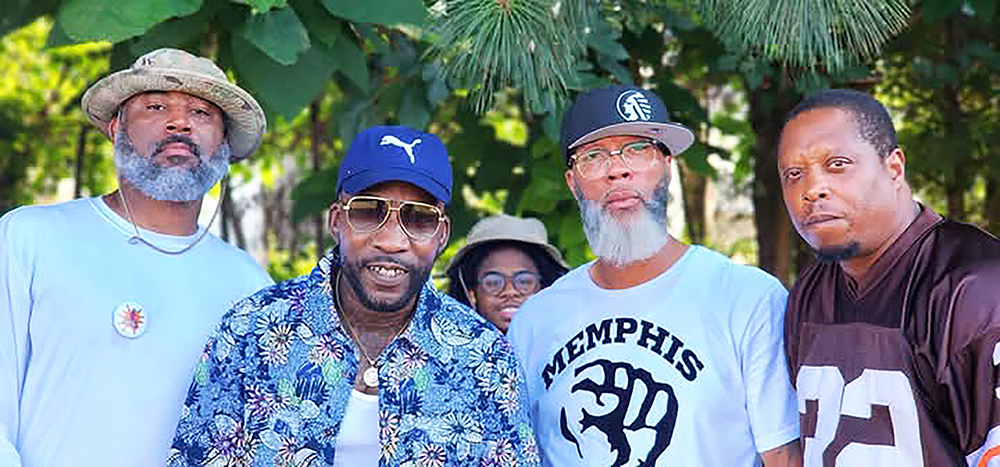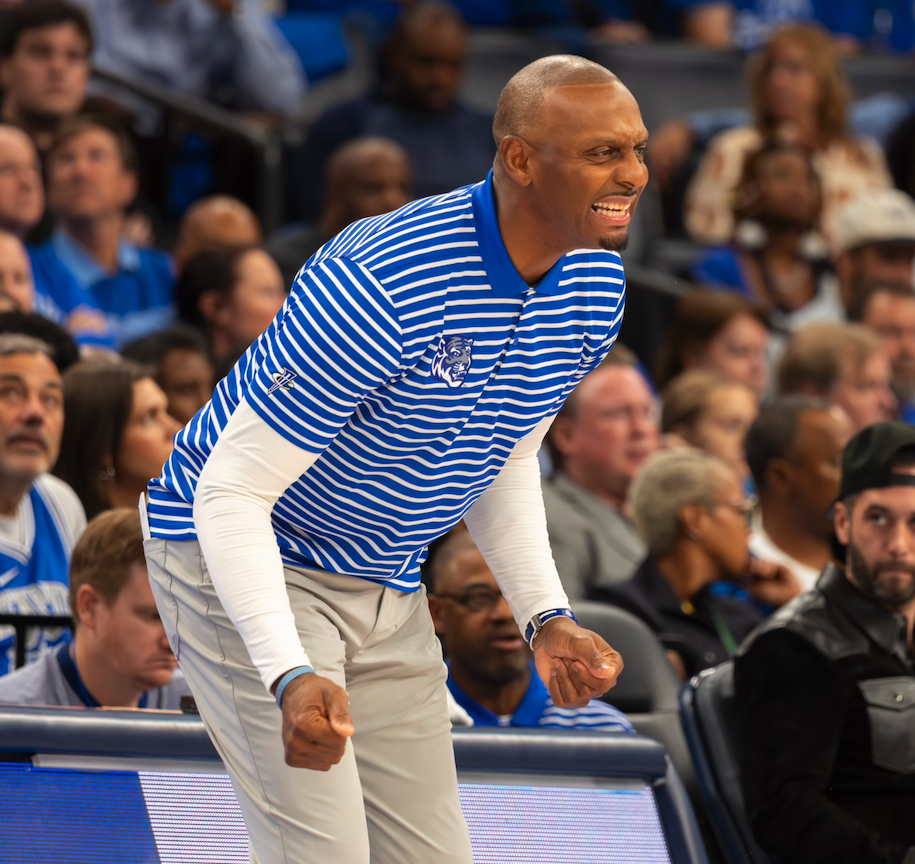Dear Santa,
We, the writers of the Memphis Flyer, promise we’ve been good boys and girls. Really good. We only made fun of The Commercial Appeal once this year — just one time — well, one time this month. Sure, we misspelled Gannett while we were at it. Maybe that was karma; maybe that was you, Santa. But we’ve been good. We started showing up to meetings, occasionally on time. We’ve learned about spell-check — who knew that existed? We even got on Bluesky. We’re keeping up.
Oh, Santa, we only have a few things on our list this year, and we put them all in our gift guide for our readers. We’re sure they’d like some things from our list, too. They like to support local businesses. So you don’t mind that we put it all in print, do you? And that we tell our readers to also get their gifts for their loved ones from these shops and makers? We can only write so much; being so good these days has made us so tired. So, yes, Santa, your letter and our gift guide will have to pull double-duty. Take it or leave it. And, readers, please do take it; don’t leave it.

Flashback
Millett and Gene Vance describe their well-known emporium on Central Avenue as a “vintage department store,” and that’s a very good description. They should know. The couple opened Flashback in 1984, just in time for Christmas that year. Forty years later, they’re still at it. Describing the kaleidoscope of merchandise inside is a challenge because there’s just so much of it. It’s a world-class vault of collectibles — everything you could imagine, and much you couldn’t begin to. You’ll find clothes from several eras, hats of all kinds, kitchenware and glassware, posters and paintings, groovy new mobiles, funky furniture, fun-house mirrors, and even a giant mounted swordfish. Go in and poke around. There’s probably something at Flashback for everyone on your gift list, no matter your budget. Get funky. — Bruce VanWyngarden
2304 Central Avenue, (901) 272-2304, flashbackmemphis.com

9906 Candle Co.
Candles and fragrances are key to setting the perfect vibes. Whether you’re trying to curate the ultimate homey experience or looking to mimic the ambience of that luxurious getaway you find yourself slipping back to, scents can help you achieve that goal. This holiday season, instead of setting an alarm to stand in line at a mass-market retailer, consider supporting a local Black-owned business that specializes in hand-poured, coconut soy candles and skin-safe room and linen fragrance mists.
9906 Candle Co. is a Memphis-based brand founded by Denise Weary. Weary’s brand is driven by “the philosophy of providing luxurious yet affordable home fragrance.” The founder goes on to say that her products reflect her commitment to simplicity and elegance with her minimalistic and charming packaging.
“Are you ready to treat your nose, treat your space? We’re out here changing atmospheres,” the company asserts.
Some of the “best smellers” include the Coco and Cedar candle with scents of jasmine, vanilla, coconut, and sandalwood, and the Sweet Stones mist with notes of citrus, cranberry, champagne, musk, praline, and caramel. Other scents include Lure, Floral Cacti, and Mandarin Escape.
You can purchase an item directly from the website at 9906candleco.com, or you can shop a local pop-up this holiday season, such as the Lightfoot Farm Market in Millington on Saturday, December 7th, or the Holiday Market at the Memphis Farmers Market on Saturday, December 14th. — Kailynn Johnson
9906candleco.com

River City Records
The vinyl records boom shows no sign of slowing down. This year, the hot records are all by women artists, says Chris Braswell, owner of River City Records. “A lot of the new pop artists are women, like Olivia Rodrigo, Taylor Swift, Lana Del Rey, Sabrina Carpenter, [Charli XCX] Brat, and Chappell Roan. She was on Saturday Night Live three weeks ago, I believe. I didn’t see it, but I had several people come in Sunday saying, ‘Did you see Chappell Roan last night?’”
Now entering its fourth year of operation at 101 S. Main, River City Records has a huge selection of music, and the equipment to play it on. “Our turntables have been really popular,” says Braswell. “People are still getting turntables for Christmas, and we’ve got several to choose from.”
If you don’t know what to get, don’t despair. “People sometimes don’t know the right album to buy for somebody, or if they’ve already got that particular album of a certain artist. Gift cards are really popular here, so they can stroll through the store and decide what record they want.”
River City Records’ Dave Anderson says there’s even more to choose from. “We’ve got vintage T-shirts, and then we’ve got our own brand, and other studios. Our T-shirts are really popular.”
Braswell says to be on the lookout for specials this holiday season. “We’re gonna have a big $2 record sale. We’ll have 12 to 14 crates of $2 records. That’s a good way for people to add to their collection on the cheap.” — Chris McCoy
101 South Main, (901) 359-5597, rivercityrecordshop.com

Memphis Arts Collective Holiday Market
Feeling a little disgruntled with the standard corporate online shopping options, I decided to gift locally made art to friends and family this holiday season. And as soon as I stumbled upon their unassuming holiday-only storefront in Gattas Plaza, near the Knowledge Tree, I knew I’d found the right place. Through those double doors, a world of color opened up like I’d landed in Oz, as I surveyed the booths of nearly three dozen craftspeople and their wares, with all manner of pottery, glass, jewelry, metal, fabric and fiber, mixed media, and photography on display before me. What’s more, the vibe was pleasant and welcoming, perhaps because of a kind built-in camaraderie among members of the Memphis Arts Collective, organizer of the holiday market.
Cat Snyder, a glass sculptor who’s selling her work there, as well as helping to produce the event, was just as enthused about the other members’ handiwork as her own. “Oh, you’ll love Brian Maness’ stained glass over there! And there’s an incredible potter next to him,” she exclaimed. I was drawn in by both the conviviality and the vivid artwork, from objets d’art to paintings to prints to hats to cards, all fresh out of the artists’ studios, looking for the perfect wall, shelf, or wardrobe to call home. — Alex Greene
Gattas Plaza, 4998 Summer Avenue, through December 24th, Monday-Saturday, 11 a.m.-7 p.m. | Sunday, noon-5 p.m. | closed Thanksgiving Day | Christmas Eve, 11 a.m.-4 p.m. | silent auction to benefit Miracle League of Memphis, memphisartscollective.com/holiday-artist-market

Hound Dog Apparel
You’ve seen someone wearing that bright yellow T-shirt from the old Buccaneer Lounge and thought you’d been out-Memphised.
It must be the best thrift store find of all time, you thought. But it looks so new. How did …? But you push the question away before allowing yourself to truly consider the person might be a time traveler.
While not a traveler, per se, Rachel Ford does have a time machine. Her Hound Dog Apparel can transport Memphians back to an age when lemongrass tofu flowed freely from Pho Binh, browsing at Bookstar was an option, and birthdays were made for Celebration Station.
The small, locally owned and operated clothing company specializes in reproductions and reimaginings of some of your favorite bygone Memphis establishments stretching all the way back to the ’70s. If you’ve spent any time in Memphis over the last few decades you’re sure to find a solid dose of nostalgia browsing through their tees.
Hound Dog is not a one-trick pony, though. (Though, you can find a design from The Pony, iykyk.) There’s a Barbie/barbecue mash-up you never knew you needed. There’s also plenty of Grizz and Tigers shirts to make you stand out in the crowd. Only the truly enlightened Memphian will grasp the timely nostalgia of Hound Dog’s “Knuc-ee’s” tee. *chef’s kiss*
Hound Dog can be found at most major festivals around town — just look for the booth with the giant crowd around it. But if you can’t make it to town, place your order by December 5th to ensure it’s on time for the holidays. — Toby Sells
hounddogapparel.com

Jimmy Crosthwait’s Clocks and Chimes
Give people more time for the holidays. As in a Zen clock made by Jimmy Crosthwait.
The puppeteer, artist, and musician (who co-founded Mudboy and the Neutrons and now plays with Sons of Mudboy) is again offering his Zen clocks and Zen chimes as well as his candlestick sculptures at WinterArts. He also will be featuring new pieces which he calls “Karmic Wheels.”
“The Wheel of Karma is a Hindu and Buddhist concept of just life and rebirth and death and rebirth,” Crosthwait says. “How you live this life will determine your status in the next life. … I’m taking a certain artistic license when I design these.”
The wooden pieces are about 21 inches across, he says. “And have, for the most part, ceramic centers with spokes radiating out to the rim.”
The spokes are metal wires onto which Crosthwait threads beads. Some of the pieces, which are stained, have appliqués around them. Others are etched into the wood around the hub with a laser printer. “Some are cut out of a Masonite-like material,” he says. “And I will glue that to the wood and stain it.”
Crosthwait, whose clocks have no hands or moving parts, says the pieces essentially look like clocks. They’re round and they have a pendulum. But there are no hands.
This year, Crosthwait’s clocks are a little bit different. “I was mostly putting them on serving trays, platters. And I would have pendulums hanging down that were usually some sort of metal or tinsel. This year, I’m doing, essentially, a lot of wooden pieces that have either appliqué on the rims or are etched with the laser printer. Just carved into the wooden circles.”
Some feature spoons containing “a little ceramic orb to complement the ceramic centers of the clock.” — Michael Donahue
WinterArts, The Shops of Saddle Creek, 7509 Poplar Avenue, Germantown, November 30th-December 24th, winterarts.org

Five in One Social Club
For those who like to get crafty — whether the gifter or the giftee — Five in One Social Club is the place to go. For starters, it’s full of stationery, crafting supplies, embroidery kits, felting kits, and locally made goods from Memphis-y T-shirts to Baby Creep’s creepy baby vases, all of which have great gifting potential.
But the shop also offers a whole calendar of craft workshops, including Stained Glass Ornaments on December 10th and Woodburning Ornaments on December 28th. Now, the options with these workshops and gift-giving are endless, kinda. You can a) make something in one of these workshops to give to your recipient (throwback to childhood DIYs you gave to your parents; these will look better though, hopefully, depending on your skill level); b) you can bring your fellow crafty giftee to a workshop with you (quality time = the gift a lifetime, as long as your presence isn’t god awful); or c) you can get your loved one a Five in One Social Club gift card to choose a workshop they can attend with someone whose company they actually enjoy any day of the year — well, mostly, there’s a calendar and all.

Five in One Social Club is also featured in the Women-Owned Passport, through which shoppers who visit certain women-owned businesses can collect stamps and receive a special offer with purchase between now and December 31st. If you collect stamps from every shop, you’ll be entered for a chance to win one of three prizes valued at over $300. The best part? You’ll be supporting women-owned businesses! There are 17 businesses participating, but I’ve reached my word limit, so … I can’t list them all. Sorry! I recommend you Google “Women-Owned Passport Memphis” or follow this link here. Happy shopping! — Abigail Morici
2575 Summer Avenue, (901) 308-2104, fiveinonesocialclub.com

Pile of Threads
Everyone loves a bit of embroidery to add just the right amount of pizzazz to any garment, and Pile of Threads does it best. With recycled, hand-dyed, neon-embroidered totes proclaiming “I Love Memphis Women” and cheeky “F Around & Find Out” baseball caps, Pile of Threads has something for just about anyone. Especially because you can also get customized work. That includes monograms, lettering, pet portraits, pennants, custom patches, small designs, embroidered jeans, wall art — just about anything you can think of. All you have to do is fill out the form provided on pileofthreads.com and allow three to four weeks for owner Whit Washington — the self-proclaimed “Stitch Bitch in Charge” — to work her magic on her 100-year-old embroidery machine.

Washington also has items available for purchase at Stock & Belle and Falling into Place. And she’ll be hosting a pop-up shop during WYXR’s Raised by Sound Fest’s after-party on December 7th, with vintage goodies on hand for you to get embroidered — or you can bring your own. Items should be 100% cotton, non-stretch material like denim or canvas. Prices begin at $30 for this service. Sounds like the perfect stitchuation. — AM
pileofthreads.com, Stock & Belle, 387 South Main | Falling Into Place, 2613 Broad Avenue | Raised by Sound Fest’s After Party, Crosstown Concourse, 1350 Concourse, Saturday, December 7, 9-11 p.m.











